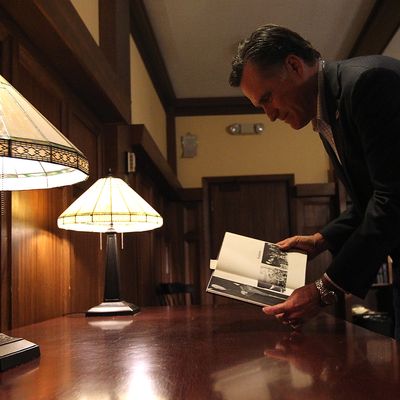
Mitt Romney has been seen toting around a copy of The Escape Artists, Noam Scheiber’s book about the Obama administration’s response to the economic crisis. Friday, Romney proffered his book report. The book, says Romney, describes how Obama deliberately chose to sacrifice a faster recovery by passing health-care reform. “In this book, they point out that they said the American people will forget how long the recovery took,” Romney said. “So that means they went into this knowing that when they passed Obamacare, it was going to make life harder for the American people.”
I commend Romney on his choice of reading material. The Escape Artists is a compelling narrative, deeply reported and beautifully written. Yet Romney’s account is wildly wrong in two major ways, one of which undermines what is supposed to be his central economic argument.
The passage cited by Romney as evidence that Obama willingly chose to “make life harder for the American people” is an interview with Larry Summers:
“I always admired the president’s courage for recognizing that 50 years from now, people would remember that all Americans had health care,” Larry Summers later said in an interview. “And even if pursuing health care affected the pace of the recovery, which was unlikely in my view, people wouldn’t remember how fast the recovery from this recession was.”
As you might notice from the phrase “even if,” Summers denied that health-care reform affected the pace of the recession. That is, he was claiming the opposite of the position imputed to him by Romney. Over e-mail, Summers further explains his view that health-care reform would aid economic growth:
I obviously did not mean that obamacare would make hurt the american people or the recovery. Indeed I am on the record with the various economic advantages that flow from it. I gave such a speech during the health care debate highlighting: (i) reduced compensation costs for employers (ii) reduced disability (iii) increased competitiveness (iv) more demand for key industries like pharma (v) greater ability to pursue a cost control agenda once universal access was achieved. The word unlikely is operative here.
Summers’s interview denying that health-care reform slowed the recovery does raise the question of why he felt compelled to deny such a thing in the first place. Nobody in the Obama administration believes that the health-care-reform law slows economic growth. Even if they did believe such a thing — hypotheticals again! Maybe Romney will quote me next — the law is phased in so slowly that it could not possibly have affected the recovery’s pace.
Rather, the mechanism by which health reform could have impacted the recovery that weighed upon members of the administration was that it consumed political oxygen that could have gone into additional recovery measures. Noam makes this case in the book, that Obama should have abandoned health-care reform and instead championed more stimulus. I don’t happen to agree with that argument. (I would note that The Escape Artists isn’t really a polemical book, but a narrative with gripping character portraits and a loose argument attached to it.) But that is the case Summers was rebutting. Like Summers, I think that neither the public nor Congress had any appetite for additional economic stimulus — indeed, they viewed deficit spending as the problem, not the solution — and I see little evidence that Obama or any president could have persuaded them to change their mind.
What makes Romney’s embrace of this argument so strange is that it is the complete opposite of his own argument. Romney’s current belief is that the tepid pace of the recovery is attributable not to the stimulus being too small but to it being too large. Here, the same week he cited The Escape Artists, is Romney’s “prairie fire of debt” speech:
America counted on President Obama to rescue the economy, tame the deficit and help create jobs. Instead, he bailed out the public-sector, gave billions of dollars to the companies of his friends, and added almost as much debt as all the prior presidents combined.
The consequence is that we are enduring the most tepid recovery in modern history.
This is his current position: The economy would be growing faster if we had been running smaller deficits, or possibly no deficits at all, since 2009.
Now, this hasn’t always been Romney’s view. At the very outset of the crisis, Romney, like most Republicans and the majority of mainstream economists, advocated the textbook response to an economic crisis of temporarily increasing the surplus in order to prop up consumer demand.
Early in 2009, Romney said Congress was “rightly focused on a stimulus to stop the economic decline and end the recession,” although he hedged his endorsement with a caveat that returning money to taxpayers would give the stimulus a “bigger bang for the buck” than federal spending.
Asked specifically on CNN in January 2009 whether he supported Obama’s call for a $750 billion stimulus, Romney did not object to the size or composition of the plan. Instead, he expressed general support for stimulus, citing a loss of $400 billion in consumer spending from the economy. “Government can help make that up in a very difficult time,” he said, adding later: “I’d move quickly. These are unusual times.”
But Romney has since joined his fellow Republicans in completely rejecting this entire economic worldview, and now believes, or claims to believe, that reducing the budget deficit would increase short-term growth. What The Escape Artists argues is that the passage of health-care reform cost Obama the chance to pass more stimulus, and increase the deficit even more. If this is true (which, again, I don’t agree with, but we can’t know because it’s hypothetical), then the passage of health-care reform actually helped the economy, by Romney’s current way of thinking.






























